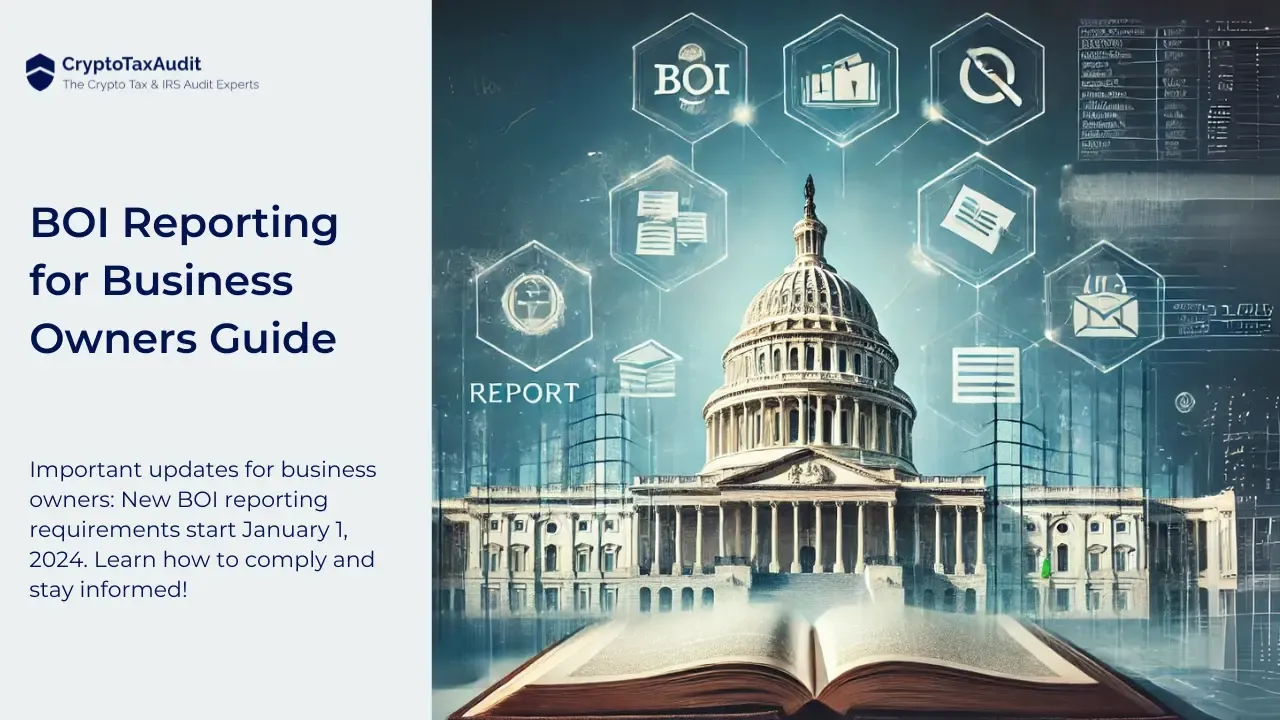
The SEC and other US government agencies are claiming that many, perhaps most, crypto are securities. Are they correct? And how does that affect you as a crypto trader or investor? (TCDS-06)
IRS chief council issues two important crypto memos.
In January 2023, the IRS chief council office came out with not one, but two, private letter memorandums.
In the memorandums, the IRS stated that cryptocurrencies are not to be treated like stocks and securities.
Well, that was very exciting news for the XRP community, trying to wage battle with Gary Gensler, the chair of the SEC. But was this an accurate ruling? Is this a correct ruling?
Let's discuss these IRS rulings and see how they may affect you and your taxes.
The IRS rulings.
The chief council's office, the law group within the IRS, publishes rulings from time to time to inform people how they would treat certain situations. They do this to help clarify the law and the IRS's regulations.
In January 2023, they issued two memos on how are they are going to treat cryptos and how cryptos would be treated when used for charitable purposes. These two "private letter rulings" both include a common paragraph. In that paragraph, they refer to a section of the tax code called section 165 paragraph G.
The common paragraph.
In the paragraph, the term "security" is used. The definition provided is "a share of or stock in a corporation or the right to subscribe for or to receive a share of stock in a corporation." As you can see, the word security has a very specific meaning for the IRS. We call this a "term of art."
Terms of art.
What is a "term of art"?
A "term of art" is a word or phrase that has a specific meaning in a particular context.
It not typically the meaning you would associate with it in general language. In fact, in the case of this paragraph, the definition of security only applies to specific subsections of the law.
Section 165G discusses "worthless securities" where it says that cryptocurrency is none of the items listed in Section 165G(2) and therefore the section that defines a security does not apply. Meaning, the IRS is stating, in the private letter rulings (memos), that cryptos are not securities.
A blunt statement.
The IRS made a very blunt statement, and they repeated it in these two different letters. But is their statement true?
As I mentioned earlier, the term "security" is a term of art. Yet, a share of stock in a corporation is also listed there. The terms "share" and "stock" are also terms of art. Let's dig into them next and see what we can discover.
Shares and stock.
Now, where are the terms "share" and "stock" defined? They're not defined in this paragraph or section. It turns out that they're defined in tax code section 7701. This is the definition section of the tax law. If terms are not otherwise distinctly expressed, then the general definitions are generally used.
Corporations.
Another important definition is "corporation". This term, according the the IRS definitions, includes associations, joint stock companies, and insurance companies.
If we were talking about Apple Corporation, that's a joint stock company. So what is an association?
The word "association" is actually not a term of art. No special definition is provided. We need to go back to other dictionaries to find out what the word association means.
What are associations?
Let's look at the definition of association.
An association is a group of persons banded together for a specific purpose.
That's another way of saying that associations are groups of people coming together for a specific purpose. There are lots of different types of associations. These include various clubs, associations that are incorporated, and associations that are unincorporated.
A crypto association example.
If you go to the Ethereum website, you will find something called a DAO, a Distributed Autonomous Organization. The first DAOs occurred on the Ethereum website. Given that, this is an authoritative place to go and research DAOs.
A DAO is a collectively-owned, blockchain-governed organization working towards a shared mission. That sounds like the shared purpose I explained in the definition of an association. So, under the US tax code, a DAO would be considered an association.
Another association reference.
In a recent article from Bitcoin Magazine, the author wrote that the Bitcoin network is the original DAO. They claimed it was the first modern, peer-to-peer consensus mechanism upon which all the people that were participating had a shared purpose.
Given that interpretation, we can see that all cryptocurrencies could fall into this definition of a DAO whether the voting authority is happening at a node level or at the level of an individual token owner. Therefore, cryptocurrencies are associations.
Since cryptos can be considered associations, the under tax law they are corporations.
Are cryptos securities?
I have shown that cryptos can be considered to be corporations under tax law. However, does the definition of a security in section 165 apply? That is, we know that cryptos can be considered corporations, but are cryptos themselves shares of stock?
What's a share of stock?
It turns out that a share of stock is also defined. Specifically, the word "stock" is defined. The word "share" is not defined, but rather the term "shareholder" is defined.
Based on the availability of definitions, we can deduce the meaning. The word stock includes the term "shares in an association." So, the notion of an association can be applied to shares in the word shareholder. While the word share is not defined, a shareholder is a member of an association. (Yes, this reasoning can become a bit cumbersome, but that's why lawyers make the big bucks.)
Are you a shareholder?
When you hold a coin or token, you can also be considered a shareholder of that association under the tax code. Back to section 165, I have shown that cryptocurrencies meet the definition of a corporation, and owners of them would be owners in those corporations. The coins or tokens would represent shares of corporations as defined under the tax code.
Cryptocurrencies could be defined as securities in this section of the tax law.
So, how does the private letter ruling factor in?
Does the private letter ruling rule?
Does the private letter ruling change the interpretation of cryptos as corporations and coins as shares in the corporation?
In the letter, the section that reads that cryptos are "none of the items listed" in section 165G(2) may not be completely true. There may be a fairly compelling argument, in fact, where it is not true.
What about court cases?
I have not yet researched relevant court cases regarding these points. In fact, there are very few court cases in this area of the law, as related to cryptocurrencies. But there are many related to associations.
Since cryptos, also known as virtual currencies or digital assets by the IRS, are still quite recent, tax law does not yet address these issues directly.
Just because the private letter ruling says that cryptos are not securities doesn't necessarily mean that it's true.
Conservative vs. aggressive opinions.
Some people like to say that there are "conservative" opinions and "aggressive" opinions regarding the tax code. They may even talk about conservative positions in tax code interpretation, and accountants will often state that their goal is to follow the most conservative interpretation of the tax law.
Why? It is because many people are worried about getting in trouble with the IRS. They want to stay as far away from any trouble as possible, including IRS audits. So many people are interested in conservative tax treatment.
Another way of looking at "conservative" is the way by which you pay the most amount of tax to the IRS. It's conservative in that there's no line of reasoning for the IRS to demand more tax from you. So, it's conservative. If you're not worried about how much tax you pay, that's the route you might follow.
Aggressive is anything that's not conservative for most people, and for many, that scares them.
When a position is not conservative, people like to call it aggressive. I don't think that's a a fair dichotomy. There's more to it.
I can't drive 55.
When you are driving on the freeway, the speed limit in the US often reads 55. A conservative approach would mean that you shouldn't go over 55 miles per hour. And, by the way, you don't really know how accurate your speedometer is, do you? Maybe you should keep your speed at 53 or 54 because you don't want to go over 55.
If you're driving faster than 55, the conservative way of thinking if that "you're gonna get a ticket". You're going to get caught. Of course, you know that the fact of the matter is that it's not necessarily true.
People know that you can go faster than the speed limit, but that they should do so within reason. You can probably drive 60 and not get a ticket in most places. However, that could be considered aggressive since you're driving over the speed limit. You're "somewhat" breaking the law. However, you're not driving 90, so you're not aggressively breaking the law.
A conservative versus aggressive labeling is too black and white for the realities of the tax code.
If only the tax code was simple and clear, but it isn't. There are lots of interpretations that can be made.
What's the risk?
If the IRS audits you and you go to tax court, and then the court decides that you're wrong, you'll probably need to pay the tax and a small penalty. That's similar to you paying a ticket, a small penalty, if you get caught driving over the speed limit. You're not going to jail for a small infraction. In short, it's all a matter of interpretation.
It's a matter of interpretation.
And as you can see, the law is not always as crystal clear as the private letter ruling would like to suggest.
Let me give you some more perspective. The IRS has long published their "hierarchy of authority". It describes that some of their communications are more authoritative than others.
The hierarchy of authority.
The tax code itself, the Internal Revenue code, is at the top of the hierarchy. It is a set of legally binding statutes. It's what Congress has approved. So, it's the highest authority in terms of tax law.
Beneath statute are US Treasury regulations. Regulations are a formal process by which the IRS has proposed regulations. Time is allotted for public comments and then the IRS implements the revised proposals into finalized tax regulations. This has more of a vetted purpose, since regulations are created which are intended to interpret the law.
Next, we need additional interpretations. The IRS has a variety of mechanisms they use for that purpose. There are revenue rulings, revenue procedures, notices, and announcements. For example, notice 2014-21 was the one that announced how cryptocurrencies, referred to as virtual currencies, were to be treated under tax law.
Of even lesser authority are written determinations. These are considered guidance.
Beneath those are private letter rulings. These are based on a "straw man" set of facts. It is opinion.
A private letter ruling is an opinion from the IRS council's office. It is not to be used as precedence in any sort of way.
Private letter rulings, or memoranda, are not a definitive interpretation of the law. There are simply the IRS council's opinions.
Finally, other forms of information are considered to be at the lowest rung of authority. There is a lot of information about virtual currency at this level.
There's a virtual currency FAQ on the IRS website, so FAQs are considered non-authoritative. And, there are other forms of help and videos too. All of this information is at the lowest priority.
The recent crypto private letter rulings.
In summary, the private letter rulings that the IRS council's office released, are not as strong as we would want to see. It's not yet established that cryptos are not securities within the IRS statues or regulations. Time will tell whether these private letter rulings gain precedence in the IRS's hierarchy.
Not legal or tax advice.
As always, this article is not legal advice. There are many subtleties in the tax law and regulations, and experts can disagree. I recommend that you always get qualified advice before you act so you are taking your own personal situation into account.
And remember, taxes are sexy.
References.
To view the complete IRS private letter rulings mentioned in this article, see memorandums 20230211 and 20230212 on the IRS website.
DISCLAIMER: Opinions and perspectives of the author, host, and guests. It should not be construed as U.S. taxpayer advice. There are often multiple interpretations of tax law. Various strategies may be suited to specific individuals and for particular situations. Seek out professional tax, legal, or financial advice from CryptoTaxAudit or from other reputable companies.




